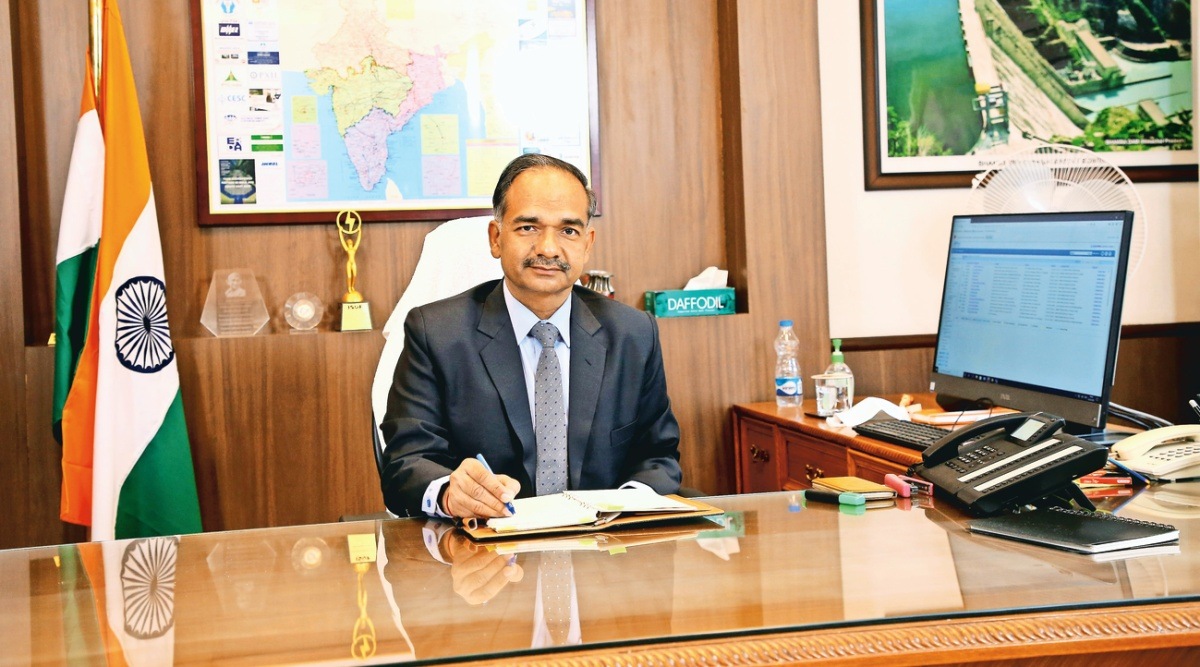Power Secretary: ‘Prepaid metering solution for bane of billing and collection … good for discoms, consumers’
Power Secretary Alok Kumar also said the ministries of power, coal and railways were actively working towards boosting coal supply, and that power generation companies, or gencos, were unlikely to face the issue of low coal inventory post monsoon in 2022.
 Power Secretary Alok Kumar (via Twitter @MinOfPower)
Power Secretary Alok Kumar (via Twitter @MinOfPower)Prepaid smart meters can play an important role in addressing the issue of billing and collection in power distribution, said Power Secretary Alok Kumar. In an interview to Karunjit Singh, he also said the ministries of power, coal and railways were actively working towards boosting coal supply, and that power generation companies, or gencos, were unlikely to face the issue of low coal inventory post monsoon in 2022. Edited excerpts:
Dues of state government to discoms and discoms to gencos have been key issues in the sector. Are these dues coming down?
Dues have not come down if you see overall, but dues for the CPSUs (central public sector utilities) have come down because they are very prompt in regulation. IPPs (independent power producers) are not so prompt in regulation. So they have to enforce the PPA (power purchase agreement) payment security mechanism. We fully support (that) and we have also told CPSUs that if some IPP is regulating for want of payment, the CPSU will not fill up that gap, and supply additional (power) to that state.
In the discom part, the cash flow situation is broadly a problem on three accounts — timely revision of tariffs, payment of subsidies and government dues by the state governments, and the collection of billing and collection by the discom. The timely payment by states is part of the pre-qualification under new schemes. Tariff determination is also a part of the pre-qualification. So these two things will redressed. They are the conditions both for our RDSS (Revemped Distribution Sector Scheme) as well as the additional 0.5 per cent borrowing by the Ministry of Finance.
For the collection part, we are pushing for prepaid, smart metering. The whole bane of the billing and collection is that these meter readers are not there. [Distribution companies, or discoms] have outsourced it. They cut corners, the bills are not given in time. Sometimes incorrect bills are given on time, and consumers don’t pay. Then, you see the number of households who are connected to the grid coming into crores in some states, like UP, Maharashtra and all. No company or no big business and never the government can collect money from such consumers and disconnect them one by one. So prepaid metering is the solution because this has been proved in telecom also, in our DISH TV (sector) also.
So, if you have a prepaid connection, the consumer will also know how much I have to pay, how much I can consume. He will pay and he will not be bothered by not receiving a bill timely or receiving a wrong bill and getting it corrected or receiving a bill after six months which you can’t pay at one go. So my take is that prepaid metering is good for discoms. And this I’d say even better for consumers for transparency and for the convenience and for the ease.
Are you confident thermal plants will be able to meet coal stocking targets and avoid a shortage past the monsoon?
I will say coal supply this year has had a good growth over the last year and previous years also, but our demand has grown even further. So looking at the demand of power, it’s going to be a task which needs continuous attention from Ministry of Power, Ministry of Coal, and Railways.
Coal production has started increasing now and we have had detailed discussions with Railways also and they’ve increased the rakes (being shipped). The rakes per day that were there on January 10 or so, now (as on February 4) it is 20 rakes per day more, but we need more rakes. So Railways has made a plan for inducting new wagons also. They’ve also identified certain critical and super critical railway works which need to be completed the earliest to increase the track capacity. We are working very closely, but it is going to be a big and difficult task. But I’m sure that with the collective efforts of all of us, that situation (low coal inventories) will not come post monsoon.
The Centre has called for lower cross subsidy surcharge overtime. How are states responding to this proposal?
You may have very ambitiously high cross subsidy percentage, (as high as) 140 per cent. But see the growth of industrial consumption in your state. It is meagre or it is coming down. So the amount of cross subsidy collected is far less. Have a reasonable cross subsidy surcharge and try to get more of industrial load so that your overall cross subsidy in terms of crore rupees is larger. That is objective. Cross subsidy is to subsidise the other poor consumers.
… As we solarise agricultural consumption, the subsidy burden of agricultural supply will come down because solar power is cheaper. So as you solarise the agriculture consumption and you bring down that subsidy amount, you will have some space available to bring down cross subsidies.
You see the states who are wiser, they have moderated their cross subsidy levels and increased their industrial consumption and their cross subsidy amount has increased. We have advised them, we have made a tariff policy and I think states will learn from the success of other states.
What are your thoughts on the Budget proposals for the energy transition and the need for viability Gap funding (VGF) in areas such as energy storage and offshore wind energy?
The most important part of the Budget is that it recognises very boldly and prominently our goal for energy transition and the need for taking it forward. So, Budget has made very good announcements in several ways, like the PLI scheme (for solar PV manufacturing), they’re also talking about the sovereign green bonds, which will be funding the green projects of CPSEs. They have also given energy storage the status of infrastructure which will lead to access to a lot of easy, convenient credit and also the lower cost of credit.
And we are hopeful that whatever it further requires we will always go to the Finance Ministry and propose new schemes and new interventions.
But one thing also to be said is that VGF or support in terms of concessional finance should be given to the extent it is required for the new technologies … like storage is very expensive, we may require some support in terms of VGF or concessional finance, maybe for 3-4 years. Thereafter, it will settle down on its own. So VGF will be need-based, to promote the requirements and most important emerging requirements for energy transition are energy storage of all types, (including) pumped storage projects for energy storage.
We have discussed internally (VGF for energy storage and offshore wind energy) in the Ministry that we will prepare a concrete proposal for VGF. We will take it up with the Ministry of finance, we are sure that they will support us because the government is committed to energy transition.
- 01
- 02
- 03
- 04
- 05































